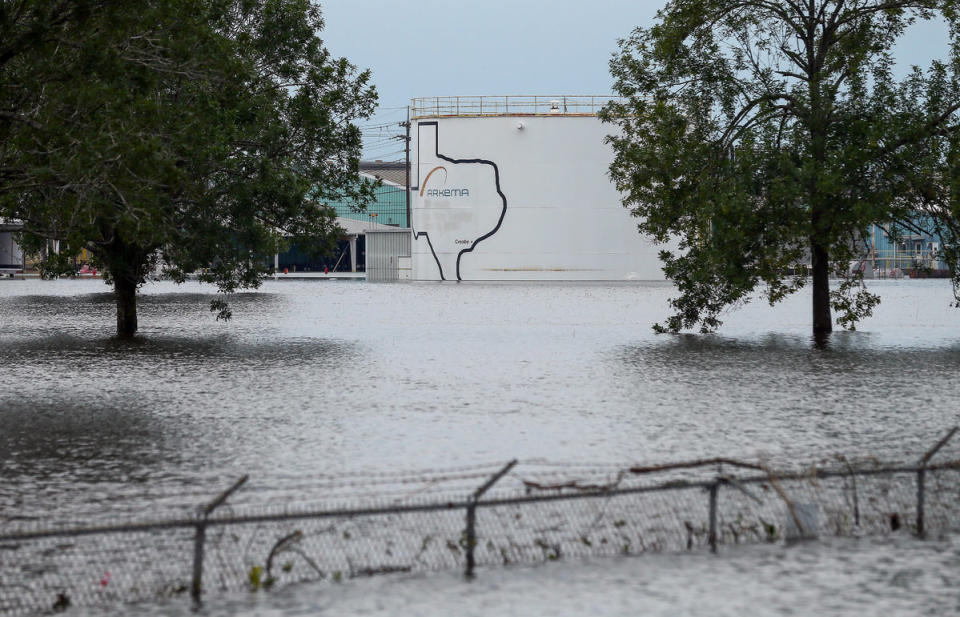Philly chemical maker warns more fires ahead at flooded Texas plant
Update 10:50 a.m.: More explosions and smoky fires are expected at the flooded Arkema Inc. plant in Crosby, Texas, company officials and local law enforcement leaders said this morning. They warned that anyone who remained near the plant risked smoke inhalation, and compared the danger to heavy woodsmoke or a Texas barbecue. Officials had already evacuated plant workers and residents from a 1.5 mile radius around the works, and had urged anyone who smelled smoke to turn off air conditioning. They said the smoke could cause eye and lung irritation, nausea, dizziness and drowsiness.
At 2 a.m., sheriff’s deputies reported two loud popping noises followed by a 30-plus-foot plume of black smoke and flames rising from a box truck. It was one of nine trucks and trailers where the company had stored organic peroxides on plant grounds, in hopes of limiting damage as the chemicals warm, expand and degrade. Chief executive Richard Ross had predicted explosions and fires on Wednesday, and said they were unavoidable as high water from Hurricane Harvey knocked out cooling and electrical systems that normally keep the chemicals cool and stable.
Without cooling, the chemicals, used in plastics production, heat up and expand in their storage tanks, forcing pressure valves to pop open, and burn, Richard Rennard, head of the company’s acrylics business, told reporters. He said the company had decided not to risk trucking the chemicals out when power failed late last week, because that could endanger evacuees fleeing the floods. Asked why the company had no way to neutralize the chemicals on site, company officials had no ready answer. The French company’s U.S. headquarters is in King of Prussia and it has facilities in Bristol, Exton and other Pennsylvania communities.
Houston Chronicle
The Arkema chemical plant is flooded from Tropical Storm Harvey in Crosby, Texas. Floodwaters from Harvey have knocked out power and generators that keep volatile organic peroxides stored at the facility cool. Employees and about 300 homes within a mile and half radius of the plant were evacuated Tuesday.
Rennard, like Ross, apologized for the inconvenience to neighbors and emergency responders. In a recorded statement posted temporarily on Harris County’s emergency Web site at 4:48 a.m. Eastern time, a computer voice speaking for Arkema said: “Product is stored in multiple locations on the site, and the threat of additional explosions remain. We sincerely apologize for this situation and for the personal impact this has had on you and your neighbors.”
Rennard also said the water is starting to recede.
The Houston area is a petrochemical manufacturing center, and companies were taking other actions to prevent chemical leakage or uncontrolled explosion. A unit of LyondellBasel, another European chemical company, said it was going to burn chemicals outside its plant today. “You might notice a bright orange flame, black smoke or a rumbling noise,” the company said in a recorded message.
Earlier: Two explosions were reported at the Arkema plant Thursday morning. Read the Arkema statement here.
Previous Story:
Arkema, the French chemical maker whose U.S. headquarters is in King of Prussia, warned Wednesday that its flooded plant in Crosby, Texas, will burn or explode unless floodwaters recede in the next few days, giving workers access to the darkened facility.
But the explosion should not hurt anyone because the surrounding area has been evacuated, Rich Rowe, Arkema’s president and CEO for North America, told the Texas Tribune on Wednesday. The plant northeast of Houston is flooded with six feet of water, knocking out its electricity and backup generators and causing the plant to lose refrigeration for chemicals that must be kept cool to remain stable.
“The materials could now explode and cause a subsequent, intense fire,” Rowe told the Tribune. “The high water and lack of power leave us with no way to prevent it.”
The warning at the Crosby works, identified by a University of Texas expert as one of the industrial sites most at risk for a toxic release, has prompted the evacuation of the plant’s workers and an estimated 300 residents in a 1.5-mile radius of the facility.
“We apologize to everyone impacted by our situation, particularly in combination with the horrible conditions visited upon the region by the hurricane,” Rowe said in a statement Wednesday evening.
Rowe said workers can’t enter the facility to prevent a fire or explosion until the floodwaters recede. And that could take six days to happen, the company said it was told. Rowe told the Tribune that the chemicals on site — organic peroxides — would “certainly” begin to degrade before six days have elapsed.
The company shut the plant Friday as Hurricane Harvey was bearing down on the Houston area and its petrochemical plants. An 11-member Arkema maintenance crew worked to keep electric power running to refrigeration equipment so the company could keep its volatile gases cold, preventing them from spreading and exploding.
But as power failed, Arkema began evacuating the complex with help from the Crosby city Fire Department, the Houston Chronicle reported. At 6:50 p.m. Tuesday, the company posted this statement, noting that the facility had received about 40 inches of rain by Monday afternoon.
“The site has been heavily flooded and without electric service since early Sunday morning. Backup generators have largely been inundated with water. A small ride-out crew of 11 people had remained on site for some days.
“As of late [Tuesday] afternoon, the situation at the Crosby site had become serious. In order to ensure the safety of our ride-out team, all personnel have been evacuated from the site at this time,” the earlier statement said. “The primary challenge has been maintaining refrigeration for [organic peroxides], which are stored at low temperature. The site lost refrigeration to all of its cold-storage warehouses when electrical power was lost and backup generators were flooded. Our team then transferred products from the warehouses into diesel-powered refrigerated containers, and continued to monitor the situation.
“At this time, refrigeration on some of our back-up product storage containers has been compromised due to extremely high water, rising to levels that are unprecedented in the Crosby area. Arkema is limited in what it can do to address the site conditions until the storm abates.”
Arkema’s Crosby products are used in the manufacture of phenols and other basic chemicals from benzene and other volatile materials. Its products help make solid-surface countertops, acrylic-based paints for cars, and PVC for pipes.
The company’s King of Prussia-based U.S. operations are a successor to the old Pennsalt Chemicals Corp. and the Pennwalt Corp.
Other Philadelphia-area chemical companies with plants in the Houston area include DuPont, which lists 10 Texas works on its website, including facilities in flooded Houston, Corpus Christi, LaPorte, and nearby towns, plus others operated by Dow Chemical Co., which will combine with DuPont on Friday.
Dow’s plants include Braskem, the Brazilian chemical company whose U.S. headquarters is at the former Sunoco Chemical center near Marcus Hook, and Axalta, the DuPont spin-off manufacturer of paint and coatings.
“Obviously, the factory is closed” at Axalta’s Houston manufacturing and training center, spokesman Matthew Winokur said. Axalta has contacted all of its 225 employees in the area, he said — some were tough to reach as the storm swept inland last week, knocking out power and spurring evacuations — and as of Wednesday morning, they were “all well and safe.” The company has continued paying workers despite the halt in production.
Axalta also has started an employee relief fund to help workers fix damaged homes and “give them a leg up to pay for incidentals and emergency things once the waters recede and the factories get up again,” he said.
Not all of Axalta’s Texas plants are flooded. The former Century Coatings plant in Jacksonville in northeast Texas, which Axalta bought early this year, is running, Winokur said.



